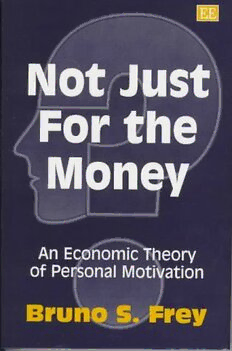
Not Just for the Money: An Economic Theory of Personal Motivation PDF
84 Pages·1997·6.228 MB·English
Most books are stored in the elastic cloud where traffic is expensive. For this reason, we have a limit on daily download.
Preview Not Just for the Money: An Economic Theory of Personal Motivation
Description:
This text poses a challenge to traditional economic theory, arguing that people do not act in expectation of monetary gain alone, nor do they work solely to get paid. It aims to show that higher monetary compensation crowds-out motivation, and offering higher pay makes people less committed to their work, and may reduce their performance. The first part of the book examines the crowding-out effect and the motivational spill-over effect. A large number of applications to constitutional questions, various policy issues and the organization of firms is explored in the second part. In the last part is a discussion of the substantial consequences for policy making and economic theory.
See more
The list of books you might like
Most books are stored in the elastic cloud where traffic is expensive. For this reason, we have a limit on daily download.
